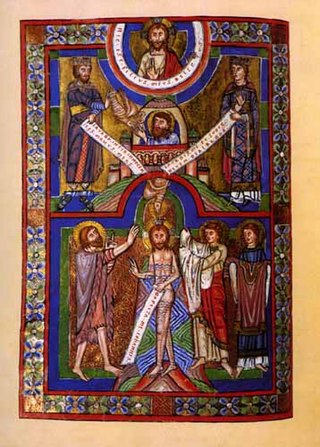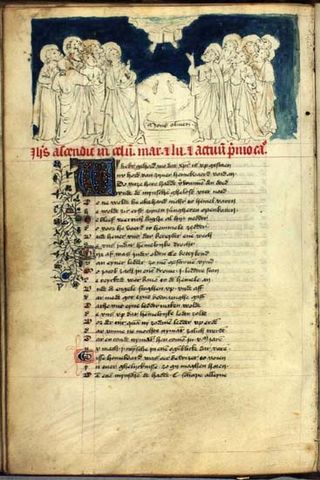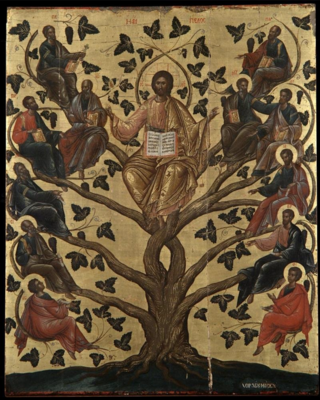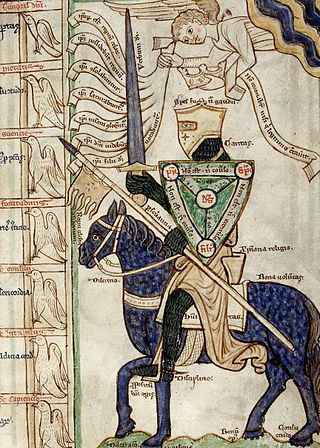Christian allegory may refer to:

As a literary device or artistic form, an allegory is a narrative or visual representation in which a character, place, or event can be interpreted to represent a meaning with moral or political significance. Authors have used allegory throughout history in all forms of art to illustrate or convey complex ideas and concepts in ways that are comprehensible or striking to its viewers, readers, or listeners.

A parable is a succinct, didactic story, in prose or verse, that illustrates one or more instructive lessons or principles. It differs from a fable in that fables employ animals, plants, inanimate objects, or forces of nature as characters, whereas parables have human characters. A parable is a type of metaphorical analogy.
Miles Christi or Milites Christi may refer to:
The name Eurymachus or Eurymachos is attributed to the following individuals:
Allegorical interpretation of the Bible is an interpretive method (exegesis) that assumes that the Bible has various levels of meaning and tends to focus on the spiritual sense, which includes the allegorical sense, the moral sense, and the anagogical sense, as opposed to the literal sense. It is sometimes referred to as the quadriga, a reference to the Roman chariot that was drawn by four horses.

The four senses of Scripture is a four-level method of interpreting the Bible. In Christianity, the four senses are literal, allegorical, tropological and anagogical. In Kabbalah the four meanings of the biblical texts are literal, allusive, allegorical, and mystical.

Typology in Christian theology and biblical exegesis is a doctrine or theory concerning the relationship of the Old Testament to the New Testament. Events, persons or statements in the Old Testament are seen as types prefiguring or superseded by antitypes, events or aspects of Christ or his revelation described in the New Testament. For example, Jonah may be seen as the type of Christ in that he emerged from the fish's belly and thus appeared to rise from death.

The Good Shepherd is an image used in the pericope of John 10:1–21, in which Jesus Christ is depicted as the Good Shepherd who lays down his life for his sheep. Similar imagery is used in Psalm 23 and Ezekiel 34:11–16. The Good Shepherd is also discussed in the other gospels, the Epistle to the Hebrews, the First Epistle of Peter and the Book of Revelation.

The True Vine is an allegory or parable given by Jesus in the New Testament. Found in John 15:1–17, it describes Jesus' disciples as branches of himself, who is described as the "true vine", and God the Father the "husbandman".

Allegorical interpretations of Genesis are readings of the biblical Book of Genesis that treat elements of the narrative as symbols or types, rather than viewing them literally as recording historical events. Either way, Judaism and most sects of Christianity treat Genesis as canonical scripture, and believers generally regard it as having spiritual significance.
Schedius was a name attributed to four individuals in Greek mythology.
Difficulty or Difficult may refer to:
In Greek mythology, Epistrophus may refer to:
The phrase Christian soldier may refer to:
In Greek mythology, the name Cleobule, Cleoboule, Kleobule or Kleoboule or Cleobula refers to:
The Chronicles of Narnia is a series of seven fantasy novels for children written by C. S. Lewis. It is considered a classic of children's literature and is the author's best-known work, having sold over 100 million copies in 47 languages. The series borrows characters and ideas from Classical, Norse, Irish, Arthurian, Islamic, Jewish and Christian mythology. Of all the mythologies taken into consideration, the Christian one is the most fundamental for the Narnia series, due to the themes covered.
In Greek mythology, the name Alcimus or Alkimos may refer to:

The miles Christianus or miles Christi is a Christian allegory based on New Testament military metaphors, especially the Armor of God metaphor of military equipment standing for Christian virtues and on certain passages of the Old Testament from the Latin Vulgate. The plural of Latin miles (soldier) is milites or the collective militia.
Militant Christianity may refer to:
In Greek mythology, Eriboea, also Eeriboea (Ἠερίβοια), were the name of the following figures: